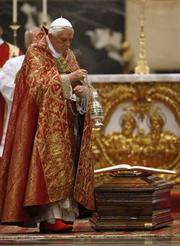By Nicole Winfield
KDKA
April 21, 2010
http://hosted.ap.org/dynamic/stories/E/EU_VATICAN_CHURCH_ABUSE?SITE=KDKAAM&SECTION=HOME&TEMPLATE=DEFAULT
 |
Photo by Pier Paolo Cito |
VATICAN CITY (AP) -- Pope Benedict XVI pledged Wednesday that the Catholic Church would take action to confront the clerical sex abuse scandal, his first public remarks calling for change since the crisis erupted.
It remains to be seen what exactly is in store. Already, the Vatican has told bishops that they must report abusive priests to police if civil laws where they live require it. It has promised "effective measures" to protect children. And Benedict himself has wept alongside abuse victims in Malta.
Advocates for victims are skeptical that real change is afoot, and say that promises have been made before. But others argue it would be wrong to underestimate the impact of the pontiff's personal involvement in generating reform.
"Pope Benedict is obviously anguished by sexual abuse in the church, as evidenced by his emotional meeting with victims in Malta," said the Rev. Jim Martin, a Jesuit priest and author. "The personal impact on the pope should not be underestimated as a goad for continuing reform. But follow-up is paramount."
During his weekly public audience Wednesday in St. Peter's Square, Benedict recounted his tearful weekend encounter in Malta with eight men who say they were abused as children by priests in a church-run orphanage. Benedict met with the men in the Vatican's embassy for over a half-hour, praying with them and listening to their stories.
"I shared with them their suffering, and emotionally prayed with them, assuring them of church action," Benedict told the audience.
At the time of the private meeting Sunday, the Vatican issued a statement saying Benedict had told the men that the church would do everything in its power to bring justice to abusive priests and would implement "effective measures" to protect children.
Wednesday, the public heard the words from the pope himself.
Neither Benedict nor the Vatican has elaborated on what action or measures are being considered. Various national bishops conferences have over the years implemented norms for handling cases of priests who sexually abuse children, none more stringent than the zero-tolerance policy adopted by the United States.
The U.S. norms, which are being held up as a model for others, bar credibly accused priests from any public church work while claims against them are under investigation. Diocesan review boards, comprised mostly of lay people, help bishops oversee cases. Clergy found guilty are permanently barred from public ministry and, in some cases, ousted from the priesthood.
Victims advocates have demanded the Vatican take stronger action and remove the bishops who shielded known abusers, shuffling them from diocese to diocese rather than reporting them to police.
On Wednesday, two church officials in Dublin told The Associated Press that the pope had accepted the resignation of Bishop James Moriarty, who admitted in December that he hadn't challenged the Dublin archdioceses' past practice of concealing child abuse complaints from police.
A formal announcement is expected from the Vatican on Thursday, the church officials told the AP, speaking on condition of anonymity.
Last week, the Vatican for the first time issued guidelines telling bishops they should report cases of abusive priests to police where civil laws require it. While the Vatican has insisted that was long its policy, it was never written explicitly and victims, lawyers, government-backed inquiries and grand juries have all accused the church of mounting a cover-up to keep clerical abuse secret and away from civil jurisdiction.
The Vatican has denied it mandated any such policy and has insisted that Benedict more than anyone has moved to crack down on abusive priests. Benedict was the architect of the 2001 Vatican norms which required diocese to send all their abuse cases to Rome, which then decides whether the diocese should handle a church trial or whether the priest should be defrocked immediately.
"I do believe that this pope is a reformer who has worked quietly from within for many years - and many years before the 2001" document, said Jeffrey Lena, the pope's U.S. attorney. "The Pope has been criticized, I think unfairly, for insufficient public gestures. ... But he is a deeply caring man who I have personally seen deeply moved by knowledge of the suffering children - and not just children of this church, but all abuse victims."
Benedict said in a homily last week that Christians must repent for sins and recognize their mistakes - comments widely interpreted as concerning the scandal. But his comments Wednesday marked his first public and direct remarks on the crisis since March 20, when he wrote a letter to the Irish faithful concerning the abuse crisis in that country.
In that letter, Benedict chastised Irish bishops for leadership failures and "gross errors of judgment" in handling abuse cases. But he laid no blame on the church hierarchy, whom critics blame for mandating a culture of secrecy that encouraged bishops to keep abuse quiet.
Three Irish government-ordered investigations published from 2005 to 2009 have documented how thousands of Irish children suffered rape, molestation and other abuse by priests in their parishes and by nuns and brothers in boarding schools and orphanages. Irish bishops did not report a single case to police until 1996 after victims began to sue the church.
The reports have faulted Rome for sending confusing messages to the Irish church about norms to be followed and, in general, for what it called the absence of a coherent set of canon laws and rules to apply in cases of abuse.
-----
Associated Press writer Shawn Pogatchnik contributed to this report from Dublin.
Any original material on these pages is copyright © BishopAccountability.org 2004. Reproduce freely with attribution.